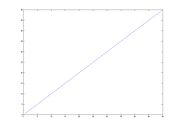| (3 intermediate revisions by one other user not shown) | |||
| Line 1: | Line 1: | ||
| + | [[Category:ECE301]] | ||
| + | [[Category:periodicity]] | ||
| + | =Periodic versus non-periodic functions ([[Homework_1_ECE301Fall2008mboutin|hw1]], [[ECE301]])= | ||
| + | <span style="color:green"> Read the instructor's comments [[hw1periodicECE301f08profcomments|here]]. </span> | ||
| + | |||
===Periodic Function=== | ===Periodic Function=== | ||
| Line 5: | Line 10: | ||
[[Image:sinwave_ECE301Fall2008mboutin.jpg|thumb|A wavy sinusoidal wave that has a period of 2 pi]] | [[Image:sinwave_ECE301Fall2008mboutin.jpg|thumb|A wavy sinusoidal wave that has a period of 2 pi]] | ||
| − | ===Periodic Function=== | + | ===Non Periodic Function=== |
An example for non periodic function would be a line that keep going: y = x | An example for non periodic function would be a line that keep going: y = x | ||
[[Image:yequalx_ECE301Fall2008mboutin.jpg|thumb|A slashing line]] | [[Image:yequalx_ECE301Fall2008mboutin.jpg|thumb|A slashing line]] | ||
Latest revision as of 06:28, 14 April 2010
Periodic versus non-periodic functions (hw1, ECE301)
Read the instructor's comments here.
Periodic Function
One example for periodic function would be a standard sinusoidal function: y = sin(x)
Non Periodic Function
An example for non periodic function would be a line that keep going: y = x



